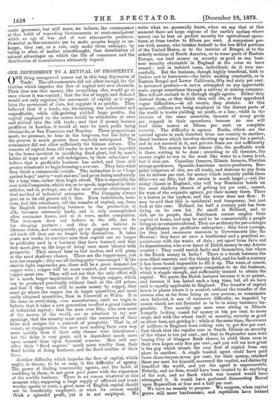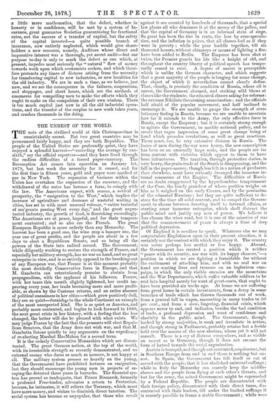ONE IMPEDIMENT TO A REVIVAL OF PROSPERITY.
ONE thing unexpected comes out in this long depression of Trade. The old economists did not allow enough for the friction which impedes the flow of capital into new channels. Their idea was that money, like everything else, would go at once where it was wanted ; that the law of supply and demand would not only regulate: the movement of capital as it regu- lates the movement of corn, but regulate it as quickly. They believed that if a trade, say, tin-mining, was exhausted and unprofitable, while silk-growing yielded large profits, the capital employed in the mines would be withdrawn at once and shifted into the silk trade ; and that if money became profitless in London, it would at once be used, profit being obtainable, at San Francisco and Bombay. Those propositions must, we presume, be true in the long-run, but the delay in the process is much greater than anybody anticipated. The economists did not allow sufficiently for human nature. The transfer of capital from old trades to new is not only impeded by the losses involved in sacrificing fixed plant, but by men's habits of hope and of self-indulgence, by their reluctance to believe that a profitable business has ended, and their still greater reluctance to begin learning a new one. They hate what they think a commercial suicide. The inclination is to "hope against hope;" and to "wait and see," and go on losing moderately for a long time, rather than begin afresh. This is especially the case with Companies which are, so to speak, imprisoned in their articles, and is, perhaps, one of the most serious objections to that method of industrial enterprise. The Company always goes on in its old groove till it dies. Even individuals, how- ever, feel this reluctance, till the transfer of capital, say, from the English iron-founding business to the production of silk, becomes extremely tardy, and is only accomplished after enormous losses, and as it were, under compulsion. The iron-man does not believe in the silk, nor do his sleeping partners ; and they do not believe in idleness either, and consequently, go on pegging away at the old trade till they can no longer help themselves. It takes years, not weeks to convince men that capital can no longer be profitably used in a business they have learned, and that they must give up the hope of being once more blessed with prosperity. They cannot bear to feel useless, and will grasp at the most shadowy chance. There are the copper-men, just now, for example ; they are all feeling quite "encouraged." If the electric light supersedes gas, there will be a great demand for copper wire ; copper will be more wanted, and consequently, copper must rise. They will not see that the only effect will be a much larger importation of the foreign copper, which can be produced practically without limit at the old prices, and that if they want still to make money by copper, they must go where the copper lies in larger quantities, and more easily obtained quantities, than in Cornwall or Wales. It is the same in everything, even manufacture, until we begin to believe that it takes a new generation to effect a grand transfer of industrial capital ; that the men over fifty, who own most of the money of the world, are so reluctant to try new openings, that the country must await the succession of their heirs and assigns for a renewal of prosperity. That is, of course, an exaggeration, the new men making their own way more quickly than if their only chance were inheritance ; but the delay is very great, and is dependent much more upon mental than upon financial reasons. Men will sac- rifice their "fixed engines" much more readily than their fixed habits of doing business, and the fixed routine of their lives.
Another difficulty which impedes the flow of capital, which ought, in theory, to be so easy, is the difficulty of agency. The power of finding trustworthy agents, and the habit of confiding in them, do not grow pan i passu with the expansion of the world's business. There is no reason whatever at this moment why, supposing a large supply of efficient and trust- worthy agents to exist, a great mass of English capital should not be beneficially employed, at what its owners would think a splendid profit, yet it is not employed. We write what we personally know, when we say that at this moment there are large regions of the earth's surface where money can be lent on perfect security for agricultural opera- tions, at from twelve to fifteen per cent. A competent per- son with money, who betakes himself to the less filled portions of the United States, or to the interior of Bengal, or to the orderly sections of South America, or to some parts of Eastern Europe, can lend money on security as good as any busi- ness security obtainable in England at the rates we have named ; and in isolated cases, individuals do it very suc- cessfully. But the business, though highly beneficial, both to lenders and to borrowers—the latter making constantly, as in Eastern Bengal and Lower California, fifty and sixty per cent. in increased produce—is never attempted on any appreciable scale, except sometimes through a railway or mining company. Men will not embark in it through single agents. Either they distrust them, or they think they will die, or they apprehend vague difficulties,—at all events, they abstain. At this moment, millions are being employed in the distant ports of the world in trades yielding no profit, or a loss ; while in the interior of the same countries, farmers of every grade are stopped in their operations, because no one will lend them money at fifteen per cent. on complete security. The difficulty is agency. Banks, which are the natural agents in such transfers from one country to another, dread business which involves shutting up money for a period, and do not succeed in it, and private firms are not sufficiently trusted. The money is here almost idle, the profitable work is there, waiting to be done ; according to all theories the money ought to run to the work like water to a lower level, but it does not. Canadian farmers, Illinois farmers, Floridan orange-gardeners, Spanish-American maize-producers, Ben- galee irrigators of rice, are all ready, and desirous to pay from ten to sixteen per cent. for money which instantly yields them fifty—we say fifty, but the return is much larger ;—yet the sleepy classes in England, who will buy Honduras bonds on the most shadowy chance of getting ten per cent., cannot, for want of the requisite agency, get their money there. There is a hiatus in the syphon, and the water does not flow. It may be said that this is accidental and temporary, but just look at this case. Holland for half a century past has been living on its own fat. So small is Holland, and so rich are its people, that Dutchmen cannot employ their capital at home, and may be said to be commercially a people living on investments abroad. They are as thirsty for per-centages as Englishmen for profitable enterprises • they have courage, for they lend enormous amounts to Governments like the Russian ; they have at once a traditional and a practical ac- quaintance with the wants of Asia yet apart from Java and its dependencies, who ever hears of Dutch money in any Asiatic country ? They could enrich India and themselves, but where is the Dutch money in India? There is a break between the over-filled reservoir and the thirsty field, and for half-a-century it has been found impossible to fill it up. The want, of course, is the necessary agency, agency competent to do the business, which is simple enough, and sufficiently trusted to obtain the capital. We quote the Dutch instance because it is so patent, and because it has lasted such a long time, but all we have said is equally applicable to England. The transfer of capital hence to places where it is wanted, without the transfer of the owners also, so far from being an easy process, as economists once believed, is one of excessive difficulty, so impeded by causes which are not financial as to be in many instances im- possible. Two months ago men were sitting in Illinois hungrily looking round for money at ten per cent. to move crops, and with the wheat itself as security, security as good as silver bars, not getting it ; while at the same time, the owners of millions in England were risking ruin to get five per cent. Just think that the regular rate in South Illinois on security of the wheat is ten per cent., and that in September men were buying City of Glasgow Bank shares, to yield them even in their own hopes only five per cent., and you will see how great is the gap which arrests the easy flow of capital from one place to another. A single trusted agent could have paid tkose share-buyers seven per cent, for their money, retained three per cent, for himself, recovered the capital, and distinctly benefited the world, and yet the agent is unprocurable. Nobody, and no firm, would have been trusted to do anything of the sort, and no Bank which was trusted would have attempted it. It would have preferred discounting Rascal upon Rapscallion at four and a half per cent. We have no remedy to propose. We suppose, when capital grows still more burdensome, and capitalists have learned a little more mathematics, that the defect, 'whether in honesty or in confidence, will be met by a system of In- surance, great guarantee Societies guaranteeing for fractional rates, not the success of a transfer of capital, but the safety of the capital invested—a quite possible branch of insurance, now entirely neglected, which would give share- holders a new resource, namely, Auditors whose direct and imperative interest was a thorough, yet secret audit—but our purpose to-day is only to mark the defect as one which, at present, impedes most seriously the " natural " flow of money towards work upon which economists reckon, and which there- fore protracts any times of distress arising from the necessity for transferring capital to new industries, or new localities for the old industry. We are in such a time, as we believe, just now, and we see the consequence in the failures, suspensions, and stoppages, and short hours, which are the methods of commerce for compelling men to make the efforts which they ought to make on the compulsion of their own wisdom. There is too much capital just now in all the old industrial opera- tions, and the transfer of the surplus to new work takes years, and crushes thousands in the doing.



































 Previous page
Previous page